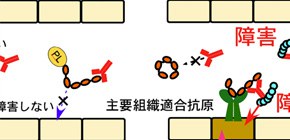
Major Targets for Autoantibodies Causing Recurrent Miscarriage and Thrombosis Elucidated
May contribute to the development of new diagnostic pharmaceuticals and therapeutic medication
A group of researchers led by ARASE Hisashi ( Professor, Research Institute for Microbial Diseases, Immunology Frontier Research Center, Osaka University) and TANIMURA Kenji (Lecturer, Graduate School of Medicine, Kobe University) elucidated a mechanism for recognizing autoantibodies, a cause of antiphospholipid antibody syndrome which causes recurrent miscarriage and thrombosis, as well as a pathogenic mechanism of such disorders.
Key points
- β 2-glycoprotein I complexed with HLA class II molecules was found to be a target for autoantibodies in antiphospholipid syndrome.
- More than 80% of patients with antiphospholipid syndrome possess autoantibodies against β 2-glycoprotein I / HLA class II complexes.
Abstract
Antiphospholipid syndrome (APS) is an autoimmune disorder characterized by thrombosis and/or pregnancy complications. β2-glycoprotein I (β2GPI) complexed with phospholipid is recognized as a major target for autoantibodies in APS; however, less than half of the patients with clinical manifestations of APS possess autoantibodies against the complexes. Therefore, the range of autoantigens involved in APS remains unclear. Recently, we found that HLA class II molecules transport misfolded cellular proteins to the cell surface via association with their peptide-binding grooves. Furthermore, IgG heavy chain/HLA class II complexes were specific targets for autoantibodies in rheumatoid arthritis. Here, we demonstrate that intact β2GPI, not peptide, forms a complex with HLA class II molecules. Strikingly, 100 of the 120 APS patients (83.3%) analyzed, including those whose antiphospholipid antibody titers were within normal range, possessed autoantibodies that recognize β2GPI/HLA class II complexes in the absence of phospholipids. In situ association between β2GPI and HLA class II was observed in placental tissues of APS patients but not in healthy controls. Furthermore, autoantibodies against β2GPI/HLA class II complexes mediated complement-dependent cytotoxicity against cells expressing the complexes. These data suggest that β2GPI/HLA class II complexes are a target in APS that might be involved in the pathogenesis.
Figure
2GPI complexed with HLA class II molecules might play an important role in the pathogenesis of APS.
A concept suggested by our findings. IFN-γ produced in inflamed tissues induces expression of HLA class II molecules on endothelial cells. When HLA class II molecules of the alleles with high affinity for linear or misfolded β2GPI are expressed on endothelial cells, the b2GPI is transported to the cell surface. Autoantibodies in APS patients bound to β2GPI complexed with HLA-DR damage endothelial cells in a complement-dependent manner.
To learn more about this research, please view the full research report entitled "2-glycoprotein I / HLA class II complexes are novel autoantigens in antiphospholipid syndrome" at this page of the Nature website.
Related Link
